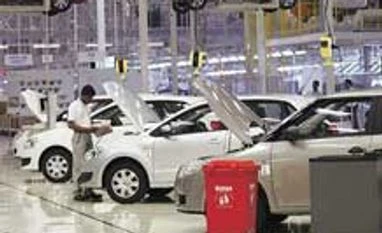With the June 30 deadline fast approaching for expiry of reduced excise rate, car makers want the government to extend it further even as they adopt a wait and watch policy before considering price hikes.
"We certainly hope that the government of India will give us an opportunity to continue keeping our customers happy," Nissan Motor India, VP sales and marketing, Ajay Raghuvanshi told PTI.
Asked if the company would raise prices after June 30, he said: "We will wait and watch the developments before making a firm decision on this subject."
Another Japanese car makers Honda said it was also hoping that the matter would get addressed and resolved before the June 30 deadline.
"We will have to follow the excise duty structure applicable during that period. The industry has already made its recommendations to the ministry through SIAM," Honda Cars India spokesperson said when asked about possible changes in price structure of its products.
In the Interim Budget presented in February, excise duty on small cars, scooters, motorcycles and commercial vehicles was reduced to 8 per cent from 12 per cent; 24 per cent from 30 per cent for SUVs; 20 per cent for mid-sized car from 24 per cent and 24 per cent for large cars from 27 per cent.
The reduction in excise duty, given to the auto sector with an aim to give some impetus to sagging sales, is applicable till June 30.
Most of the carmakers had passed on the benefit of excise duty reduction to customers by cutting product prices.
Major companies, including Maruti Suzuki India, Hyundai Motor India, Tata Motors and Mahindra & Mahindra, did not comment on the issue.
According to SIAM, excise rates would revert back to the earlier level after June 30. The auto industry body has been lobbying hard with the government to extend the reduced excise rates.
India's automobile industry has been struggling from a prolonged market slump. Car sales in India fell for the second consecutive fiscal in 2013-14 with a drop of 4.65 per cent at 17,86,899 units as compared to 18,74,055 units in the previous fiscal.
In the 2012-13, car sales in India fell 6.69 per cent, which was the first decline in a decade.
"We certainly hope that the government of India will give us an opportunity to continue keeping our customers happy," Nissan Motor India, VP sales and marketing, Ajay Raghuvanshi told PTI.
Asked if the company would raise prices after June 30, he said: "We will wait and watch the developments before making a firm decision on this subject."
Also Read
With the Budget expected only next month, the auto industry is awaiting the new government's steps on the matter.
Another Japanese car makers Honda said it was also hoping that the matter would get addressed and resolved before the June 30 deadline.
"We will have to follow the excise duty structure applicable during that period. The industry has already made its recommendations to the ministry through SIAM," Honda Cars India spokesperson said when asked about possible changes in price structure of its products.
In the Interim Budget presented in February, excise duty on small cars, scooters, motorcycles and commercial vehicles was reduced to 8 per cent from 12 per cent; 24 per cent from 30 per cent for SUVs; 20 per cent for mid-sized car from 24 per cent and 24 per cent for large cars from 27 per cent.
The reduction in excise duty, given to the auto sector with an aim to give some impetus to sagging sales, is applicable till June 30.
Most of the carmakers had passed on the benefit of excise duty reduction to customers by cutting product prices.
Major companies, including Maruti Suzuki India, Hyundai Motor India, Tata Motors and Mahindra & Mahindra, did not comment on the issue.
According to SIAM, excise rates would revert back to the earlier level after June 30. The auto industry body has been lobbying hard with the government to extend the reduced excise rates.
India's automobile industry has been struggling from a prolonged market slump. Car sales in India fell for the second consecutive fiscal in 2013-14 with a drop of 4.65 per cent at 17,86,899 units as compared to 18,74,055 units in the previous fiscal.
In the 2012-13, car sales in India fell 6.69 per cent, which was the first decline in a decade.
)